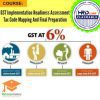 |
Introduction
As a manager, you wear many hats, managing people and resources. The ultimate result of your ability and capability in moving up the corporate ladder depends on your contribution to the bottom line of your organization. In this workshop, you will learn how to read financial statements as well as some management accounting tools for you to increase your knowledge and skills. This highly hands-on and practical mock business simulation will help you to manage your day to day operations, planning and decision making process.
How Will You Benefit
Upon completion of this programme, the participants will be able to :
- INCREASE their financial literacy & financial vocabulary for business & work
- OBTAIN a competitive edge by understanding the basic principles of accounting and fundamentals of finance and accounting
- EXPOSE to budget planning and variance analysis
- MANAGE cost and increase efficiency of their projects / departments / divisions / company or organization
- ACQUIRE the skills to detect early warning signs of possible projects or business failure
- GRASP & UNDERSTAND useful Financial & Management Accounting Tools and techniques required for effective decision making
- STRESS on the importance of business units in achieving corporate business objective
Who Should Attend
This course is suitable for Sales & Marketing, Production & Engineering, Human Resources & Finance and Accounting, Purchasing & Procurement, R&D / Production Development and Anyone who is determined to be successful in his / her career.
Methodology
This workshop’s methodology is a combination of expert input, interactive practical exercises, self-assessment, games, group discussions, exercise worksheets & presentations.
Module
- SPEAKING ACCOUNTING
- Understanding Why Accounting / Finance is Important?
- Know the Objective of a Business / Organization
- The Purpose of Financial Reports
- ACCOUNTING FRAMEWORK
- Understand the Different between Conceptual Framework and Regulatory Framework
- What are the Fundamental Accounting Concept and Assumptions used in Preparing Accounting Records and Why these are Being Used
- TYPES OF ACCOUNTS
- Differentiate between Assets, Liabilities, Expenses, Income and Equity
- Understanding the Accounting Equation
- Assets = Liabilities Equity
- Differentiate between OPEX and CAPEX
- READING FINANCIALS
- Introduction to the Various Financial Statements and Their Uses
- Statement of Profit or Loss and Other Comprehensive Income
- Statement of Financial Position
- Statement of Changes in Equity
- Statement of Cash Flows
- Tools use in Financial Statement Analysis
- Vertical Analysis
- Horizontal Analysis (Trend Analysis)
- Ratios Analysis – Operational Ratios, Financial Ratios and Valuation Ratios
- Statement of cash flows
- The Difference between Profit and Cash and why the saying “Cash is King”
- How to Analyze the Statement of Cash Flows
- Other considerations
- How to read Notes to the accounts in Published Financial Statement
- Different between Publish Accounts and Management Accounts
- What are the Limitations of Ratio Analysis
- COSTING DECISION
- Cost Behavior
- How does Cost being Define?
- How to Differentiate between the Direct and Indirect Cost?
- Differentiate the Controllable and Uncontrollable Cost
- Cost – Volume – Profit Analysis
- Learning the Contribution Formula and thus working with the Break –even Point analysis
- How to Decide on the Pricing?
- BUILDING BUDGET
- Types of Budgets
- Differentiate the Various Types of Budgets – Incremental, Zero-based and Rolling
- COMPARING BUDGET APPROACHES
- When and which is better – Top-down or Bottom-up approach?
- BUDGETING AS A PLANNING AND CONTROL TOOL
- Using the Budget to Control the Business and what are the Limitation Factors
- Understanding the Budgeting process and its Coordination
- How to Forecasting Sales Revenues and Expenses and Building up the Budgets Numbers
- When to Adjust the Budget to Reality
- INVESTMENT APPRAISAL
- Understand the Basic Investment Appraisals – Payback Period, Return on Investment (ROI), Net Present Value (NPV) and Internal Rate of Return (IRR) for Better Decisions Making
|




